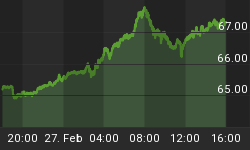Marc Faber, publisher of the Gloom, Boom & Doom report, appeared on "Bloomberg Surveillance" with Tom Keene and Alix Steel today, saying that he sees "considerable downside risk" for U.S. stocks
Faber went on to say, "We are creating bubbles and bubbles and bubbles. This bubble will come to an end. My concern is that we are going to have a systemic crisis where it is going to be very difficult to hide."
Faber on whether he's participated in the equity rise in the U.S.:
"I think that I was relatively positive about U.S. stocks since March 2009. I haven't been shorting any stocks since 2009. The U.S. march is up and consumer confidence is down. Emerging markets are performing badly relative to the U.S.. the dollar is strong, indicating a tightening of international liquidity. I do not think the U.S. market will go up a lot from here. I rather think there is now considerable downside risk."
On whether Europe can repair its house:
"They can repair it and actually Europe now has a current account surplus, which is positive. But obviously the economy is contracting. We are in recession in Europe. This will have an impact on the corporate profits of U.S. corporations as well because 40% of S&P earnings come from overseas, but the bulk actually comes from Europe and not emerging countries. I think that corporate profits in the U.S. will continue to contract as they have actually -- according to S&P -- contracted in the first quarter of 2012."
On why gold hasn't held up as a safe haven:
"When you print money, the money does not flow evenly into the economic system. It stays essentially in the financial service industry and among people that have access to these funds, mostly well-to-do people. It does not go to the worker. I just mentioned that it doesn't flow evenly into the system. Now from time to time it will lift the NASDAQ like between 1997 and March 2000. Then it lifted home prices in the U.S. until 2007. Then it lifted the commodity prices in 2008 until July 2008 when the global economy was already in recession. More recently it has lifted selected emerging economies, stock markets in Indonesia, Philippines, Thailand, up four times from 2009 lows and now the U.S. So we are creating bubbles and bubbles and bubbles. This bubble will come to an end. My concern is that we are going to have a systemic crisis where it is going to be very difficult to hide. Even in gold, it will be difficult to hide."
On whether the raiding of bank accounts in Cyprus set a precedent for Europe:
"MF Global, the depositors were also raided. It is nothing unusual. Philosophically I believe that we shouldn't have deposit insurances, blanketed insurances by governments because it would force savers to be very careful with which bank they would deposit the money. The good banks would pay very low interest and take low risks and the banks that take high risks would have high interest. By the way, in Cyrus, banks were paying very high interest like in Lebanon at the present time I can get 6% on my deposits. So the depositors should have known that something is dangerous, but I would say that the principal now is very important to understand. Until now, the bailouts in Europe and the U.S. were at the expense of the taxpayer. And onwards, in my view, the bailouts will also be at the expense of the asset holders, the well-to-do people. So if you have money -- like I am concerned -- I am sure the governments will one day take away 20-30% of my wealth."















